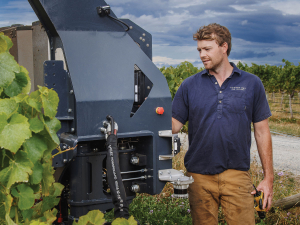A Thousand Gods
I like to think that when Simon Sharpe and Lauren Keenan heard they'd been named The Real Review Rising Star of the Year, they cried out "miladiou!"
 Cloudy Bay Vineyard Innovation and Engineering Manager Murray Faber with V3. Photo Credit: Jim Tannock
Cloudy Bay Vineyard Innovation and Engineering Manager Murray Faber with V3. Photo Credit: Jim Tannock
As grapes ripen at Domaine Thomson this season, a laser will flash green bird-scaring beams in a pattern across the vines.
The laser covers 8 hectares of vines at this small organic Central Otago vineyard, replacing nets, and the associated cost of buying, placing and removing them, says Viticulturist Simon Gourley. “We are having fantastic results.”
He will meanwhile be logging and assessing data in his Sectormentor app, with annual comparisons, instant calculations, and graphed trends available at all times, including winter pruning weights, flower counts, missing vines, and soil health indicators, such as earthworm numbers. It’s not revolutionary tech, but there’s only one shot each year for grapegrowers, says Simon. “If historical data can aid the growing and harvest decisions by increasing the quantity and/or quality of our one shot, it is very beneficial.”
By the 2025 vintage, Simon hopes to have a small electric autonomous platform in place, programmed to ply the vineyard in a set pattern, perhaps with the laser or a gas gun attached, taking on jobs that are not “glamorous or high paying”, but become more costly each year. “We are a very hands-on labour-intensive operation due to our size. So if we can mechanise or use robots or cameras wherever possible, it’s a real saving for us… And we can focus on fruit quality and positioning the shoots and bunches so we can maximise ripeness and flavours to make our wine better, rather than walking around under nets scaring birds out. It changes where we spend money.”
As small companies like Domaine Thomson delve deeper into digital solutions, other wine industry players have leapt in boots and all to invest in robotics, including autonomous vineyard tractors that can undertake myriad vineyard tasks, including weeding, trimming and spraying, while collecting valuable data. Treasury Wine Estates Ltd is trialling Prospr, developed by New Zealand company Robotics Plus, while Pernod Ricard Winemakers has worked with Marlborough-based startup SmartMachine on Oxin. Meanwhile V3 – designed inhouse by Cloudy Bay’s Vineyard Innovation and Engineering Manager Murray Faber - has done four weed passes at the 66-hectare Mustang Vineyard this season, while also mowing and vine trimming the herbicide-free block. Brock Campbell, Cloudy Bay’s Vineyard Sustainability and Operations Manager, says V3 frees up staff to do more technical work and higher skilled tasks, “rather than moving along at a couple of kilometres an hour doing under vine weeding.” Murray, who developed the first iteration out of “rusty bits of metal” during Covid-19, says the past three years have brought “massive change” in the technology that enables driverless systems, and also in the confidence people have in them. “And I think that will change a lot more in the next five years.”
Anyone working in a winery or a vineyard over the past few years would have seen a huge increase in technology solutions available, writes Tracy Atkin on page 28 of this edition. The startup advisor and investor, and board chair of SmartMachine, lists drones, satellites, and camera technology for aerial mapping and spraying, crop and irrigation management, pest and disease detection, and yield estimation. Along with robotic autonomous vehicles and bird scarers, there are innovations for workforce planning, health and safety, compliance, and irrigation management, as well as plant and soil sensors for water stress measurement and nutrient management, she says. “In the winery, there is new nanotechnology for molecular filtration, enzyme sensors, wine analytics, and fermentation monitoring.”
Viticultural consultant Dr David Jordan recalls visiting his cousins on their Canterbury farm in the 1990s, where they’d be at the steering wheel of an open-top tractor, or in the depths of office paperwork. These days those cousins have moved their office into the airconditioned cab of a GPS-fitted tractor. “They need someone in a tractor, but they don’t need to be on the steering wheel… Interestingly, I reckon those farmers are more aware of their soil environment than they were 30 or 40 years ago.” Likewise, new technology being taken up in vineyards is freeing up time for more “philosophical and stylistic developments”, he says. “With the clever technology you can get a lot more targeted activities than the broadacre approach that many of our vineyards are under. So it can advance us to be better than when we rely only on human responses.”
Winegrowers and wineries that don’t tap into new tech, if it could improve the way they grow and make wine, “do so at their own peril”, he adds. For smaller operators the technology might be evolution of existing tools, while for others at “the bleeding edge” of developments, the progress is in artificial intelligence and driverless vehicles. In either case, it’s a rapidly changing field that will see technology become increasingly accessible and affordable for all operators, David says. “You scratch the surface of these opportunities and you go, ‘wow, these advances are mind-blowing – and where they can take us, beyond comprehension’.”
Jimmy Stewart is quite literally chipping away at circularity.
A Wine Marlborough Lifetime Achievement Award is “very premature”, say Kevin and Kimberley Judd, nearly 43 years after they came…
Wine tourism has evolved into a sophisticated, diverse and resilient part of the New Zealand wine sector's economy. Emma Jenkins MW talks…